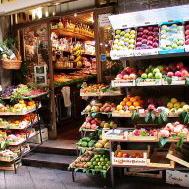 What makes foodies drive past the local chain grocery store, and travel miles out of their way, simply to buy pricey all-natural flax-seed bread and tomatoes cultivated from the farm down the road?
What makes foodies drive past the local chain grocery store, and travel miles out of their way, simply to buy pricey all-natural flax-seed bread and tomatoes cultivated from the farm down the road?
Because these days, it’s not enough to eat healthy.
Locavores are all about finding food that is grown or produced locally, and even limiting the term “local” to a certain radius (usually 50-100 miles). The idea of “sourcing” is to find food with its biography: where it was grown, who grew it, and how ended up on the shelves. And specialty grocery stores often satisfy both needs.
In response to this demand, gourmet grocery stores are springing up across the country, many of which are definitely worth a stop on your next visit.
On the one hand, there’s the health aspect: “People are becoming more concerned with how their food makes it to their table,” explains Christopher Eley, who has owned and operated the Indianapolis-based Goose the Market (www.goosethemarket.com, 317-924-4944) since September 2007. “A perfect example is this recent salmonella outbreak; five months later they’re still not sure of its source. Is it the tomatoes? Is it the jalapeños? No one knows.”Then there’s the fact that people enjoy jumping on the bandwagon. For Eley, the trend towards specialty grocery stores is tied to the ever-growing Slow Food Movement, which entails eating local, being sustainable and best of all … avoiding that greasy Big Mac!
“People, cities and cultures are losing their identities in the Starbucks, McDonald’s and the Wal-Marts of the world,” said Eley. “People want to be comfortable with what they are putting in their mouths.”
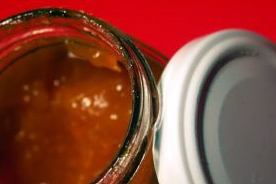 Or is it something else? What about that oh-so-special feeling of entering a neighborhood market where the owner furtively hands you that jar of preserves you’ve been craving ever since that farm-to-table dinner last month?
Or is it something else? What about that oh-so-special feeling of entering a neighborhood market where the owner furtively hands you that jar of preserves you’ve been craving ever since that farm-to-table dinner last month?
Alan Guinn, managing director of The Guinn Consultancy Group, has worked in both marketing and food service for more than 20 years. “People like to feel as though their needs are specifically being met,” he said. “Everyone likes to be catered to. Whether it’s a special type of bread, or custom cutting of steaks, local produce or locally-produced foods, there is simply no substitute for that ‘custom service’ feeling at the gourmet grocer.”
Not only do we like to feel special, said Guinn, but we also value these stores as touchstones to our cultural past: “It harkens back to a simpler time,” he explained. “Think about the butcher shop on The Andy Griffith Show.”
As for Eley, who can name each farm where his dry-aged beef, free-range chickens, and wild turkeys come from, he also points to the benefit of supporting other like-minded individuals. “When working with people who actually grow the produce, you have a sense of trust that these individuals want a wholesome product that can support their families,” he said. “It’s not so much a concern of being ‘certified organic’ as it is supporting people who really care about their product.”
The following foodie Meccas are spread across the country, so it’s not difficult to find one near you home—or nestled in your favorite vacation spot.
Lionette’s Market – Boston, Massachusetts
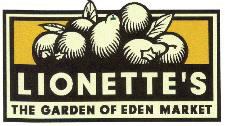 Jamey Lionette, owner of this South End-based market, has her own vehement opinion on the rising popularity of locally-grown products: “You ask what makes people drive an hour to buy local bread?” she said. “I ask what made people ignore their neighbors and communities and drive to a chain supermarket to buy asparagus from Peru and organic garlic from China?!”
Jamey Lionette, owner of this South End-based market, has her own vehement opinion on the rising popularity of locally-grown products: “You ask what makes people drive an hour to buy local bread?” she said. “I ask what made people ignore their neighbors and communities and drive to a chain supermarket to buy asparagus from Peru and organic garlic from China?!”
For Lionette, buying locally grown food is perfectly natural – pun intended: “For tens of thousands of years, local food was just normal food. But now it’s considered rare and ‘gourmet.’”
Rare is exactly what this kind of food has become. In some cities, those who want grass-fed beef will probably have to poach their own heifer. However, Lionette’s Market is one of the few stores around the country to carry 100 percent grass-fed beef raised on local farms. The shelves are full of locally-produced goods, with more than 50 cheeses from the Boston area.
577 Tremont St. Boston, Massachusetts; 617-778-0360, www.lionettesmarket.com
Boone Hall Farms – Mt. Pleasant, South Carolina
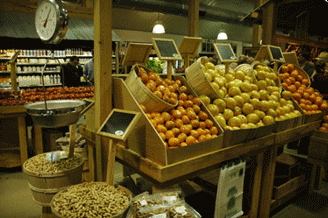 The produce here is as fresh as it gets – since it comes from the thousands of acres surrounding Boone Hall Plantation across the street, which has been in operation since 1681. The plantation is open for tours or walks through its antebellum gardens and also has you-pick gardens where visitors can pick their own produce, like peaches, strawberries, tomatoes, blackberries, and blueberries.
The produce here is as fresh as it gets – since it comes from the thousands of acres surrounding Boone Hall Plantation across the street, which has been in operation since 1681. The plantation is open for tours or walks through its antebellum gardens and also has you-pick gardens where visitors can pick their own produce, like peaches, strawberries, tomatoes, blackberries, and blueberries.
The market specializes in locally grown South Carolina produce, meats, and specialty products like homemade jellies and jams, and claims that “if you can pickle it, we carry it.” The Mount Pleasant Seafood (from a local favorite market on Shem Creek) and the peach salsa keep travelers and locals coming back.
2521 Hwy 17N, Mt. Pleasant, South Carolina; 843-856-8154, www.boonehallfarms.com
Glen Ellen Village Market – Glen Ellen, California
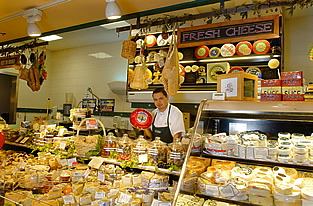 In the grapevine-tangled hills near Sonoma, the Glen Ellen Village Market serves up custom-made deli sandwiches worthy of their posh location, at reasonable prices ranging from $4.75-$7 apiece.
In the grapevine-tangled hills near Sonoma, the Glen Ellen Village Market serves up custom-made deli sandwiches worthy of their posh location, at reasonable prices ranging from $4.75-$7 apiece.
Most of their produce is organic and locally grown, and all of it is selected daily. The beef is hormone and antibiotic free, some is grass-fed, and if you prefer your meat lean and mean, they even offer buffalo. Seafood comes from local day boats, and their wine selection takes full advantage of their proximity to one of the best grape-growing regions in the world.
13751 Arnold Drive, Glen Ellen, California; 707-996-6728, www.sonoma-glenellenmkt.com
The Good Food Store – West Missoula, Montana
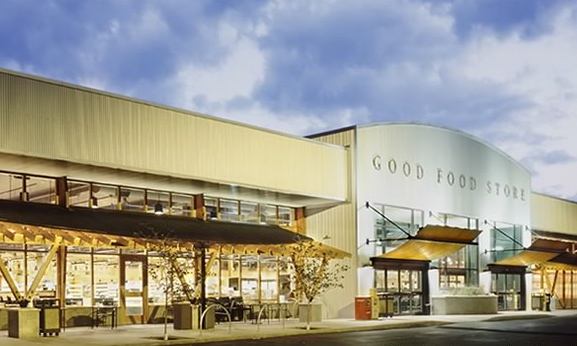 This store takes customer service to a whole new level by offering classes on how to find the cheapest deals, and then how to make a delicious meal. The hands-on cooking classes in their own demonstration kitchen range from Moroccan cooking to dim sum, and from knife skills to sushi-making, with prices ranging from zero to $35. They even offer occasional classes on gardening, taught by their own landscape artist.
This store takes customer service to a whole new level by offering classes on how to find the cheapest deals, and then how to make a delicious meal. The hands-on cooking classes in their own demonstration kitchen range from Moroccan cooking to dim sum, and from knife skills to sushi-making, with prices ranging from zero to $35. They even offer occasional classes on gardening, taught by their own landscape artist.
The Good Food Store is a non-profit corporation and donates money and leftover food to over 100 local groups and individuals. And, of course, they have locally-produced organic foods.
1600 S. 3rd St. West Missoula, Montana; 406-541-3663, www.goodfoodstore.com
Local Harvest – St. Louis, Missouri
Local Harvest works with regional farmers who practice sustainable agricultural methods, with the goal that half of everything in the store will come from within a 150-mile radius of St. Louis.
The store supports local food artisans who prepare food without preservatives or artificial flavors, and stock grass-fed bison and milk-fed pork. The locally-raised bison brisket sandwich is called “the Mo.Fo.” and is smoked in-house, while the “Skinnytown” vegetarian sandwich is topped with local produce.
3148 Morganford, St. Louis Missouri; 314-865-5260, www.localharvestgrocery.com
By Lauren Van Mullem for PeterGreenberg.com.
Previously by Lauren Van Mullem:
- Barging Through Europe
- Unexpected Foodie Destinations
- Voyage de Fromage: Destinations for Cheese-Lovers
- Global Gourmet: Food Gifts from Around the World
- Photography Tours, Hit Me With Your Best Shot
- Is a Bed & Breakfast Stay Right For You?
- Dude, Where’s My Horse? Dude Ranch Vacations
Don’t miss more foodie adventures in our Culinary Travel section.












